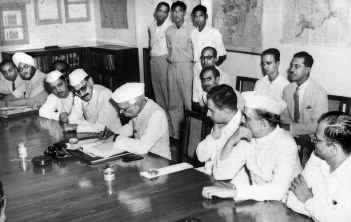
Mr.Paul Ratnam, my grandfather was a great thinker, philosopher, politician and a revolutionary. Martin Luther King Junior once second, " The ultimate measure of a man is not where he stands in moments of comfort, but where he stands at times of challenge and controversy". This exactly sums up his character. Mr. Paul Ratnam was born on April 15 1902 as the sixth son of Mr. Paul Perumal Nadar and Mrs. Ghanavadivu couple of Marthandam, in the erstwhile princely State of Travancore. Mr. Paul Ratnam qualified himself as an advocate and set up his legal practice in Kuzhuthurai and Nagercoil.
The Social life in the State of Travancore was caste based and inequality among the people, injustice and human right violations were the order of the day. The Government of India Act of 1935 allowed Indian political parties to contest elections and form governments in their own provinces under its direct control. Indian National Congress formed its governments in eight provinces in 1937. The political disturbances in Travancore owing to the hands off attitude of the Indian National Congress (Wardha resolution on 6th Feb 1938-not to involve itself in the freedom struggle of princely states) and denounce the oppressive rule nature of Diwan C. P. Ramaswami Aiyer of Travancore, made the political leaders to form a political organization of their own. Travancore State Congress was born in February 1938.

The party's goal was the achievement of Responsible Government in Travancore on the basis of adult franchise and protection of the rights of minorities by peaceful means. Soon after the formation of Travancore State Congress, its leaders under the leadership of Pattom A. Thanu Pillai decided to establish its local units all over the State. Mr. Paul Ratnam was made the secretary of the Vilavancode unit of the party.


Travancore State Congress submitted a memorandum to the Maharaja on 30th May, 1938. The following were some of the demands. The powers vested with the Diwan may be vested with a cabinet of ministers, franchise should be extended to all adults, press and judicial freedom should be maintained etc. In the meantime Travancore State Congress concentrated on enrolling more members, spreading the Swadeshi movement and building up a strong volunteer organization.

The Government, taking note of the growing popularity of Travancore State Congress, adopted coercive and repressive measures to suppress it. On 25th August 1938 the Government promulgated the emergency regulation act called the Criminal Law Amendment Act 1 and X of 1938. It authorized the Government to declare political associations illegal and ordered the District Magistrate to take possession of the land and other belongings of those associations. The act empowered the Government to take possession of printing presses. Functioning of the newspapers was allowed only when they enjoyed the support of the Government. The Government cancelled the license of Manorama printing press and attached it to the government.
Harassment and assault on some notable leaders of the State Congress also deserve special mention in this respect. Mr.K.P. Neelakanda Pillai, joint secretary of the State Congress was assaulted. M. R. Madhava Warrier and T.M. Muthai, editors of the Malayali and the Malabar Advocate were assaulted. There was a special police force for the Travancore State as in the ease of Gustappo of Adolf Hitler. Lathi charge and firing on the crowds became regular occurrence. On 31st August, at Neyyattinkara, military opened fire at a crowd killing ten persons followed by another police firing at Quilon killing one person and injuring many.


The State Congress meetings at Neyyanttinkara, Nedunkada and Chenganoor were subjected to severe attacks. In these meetings where leaders were speaking unidentified persons caused disturbances and the police lathi charged and dispersed the crowd in the name of preserving peace. The Newspaper which supported the Government action received favorable treatment by Government. The proprietor of the Malayalam Rajyam was given the contract for printing Government publications as he was supporting the Government . New associations like the Travancore State People's League, Travancore State People's federation were formed with the active support of the Government to work against Travancore Congress.
On 8th December 1938, the Government promulgated the Criminal Law Amendment Regulation X of 1938 against the forming of volunteer organizations and training centers as the Travancore State Congress was training its cadres on physical drill, signalling, saluting and various paramilitary skills. At the annual conference of Travancore State Congress at Valliyoorkavu on the 4th week of December 1938, with the aim of attainment of responsible Government, it was decided to launch a programme of direct action to get a responsible Government.

To coordinate their efforts effectively the State Congress divided the state into nine zones K.N. Kunju Krishna Pillai was in charge of Nagercoil Zorne and Paul Ratnam was his deputy. One hundred volunteers from each taluk were selected and shadow cabinets formed at Madurai, Tirunelveli and Ernakulam. Paul Ratnam was in the forefront organizing conferences and meetings and taking out processions and picketing toddy shops. Then came his arrest in March 1939.

.jpg)
CONTACT ADDRESS OF HIS GRANDSON
DR. SURESH J PAUL,EYE SPECIALIST IS
DR. SURESH EYE HOSPITAL, VETTUMANI, MARTHANDAM.
PLEASE VISIT OUR TAMIL BLOG: tamilsuresh.com
{{r.reply}}
Your comment was submitted for review. It will start display once it was approved by Admin
Comments